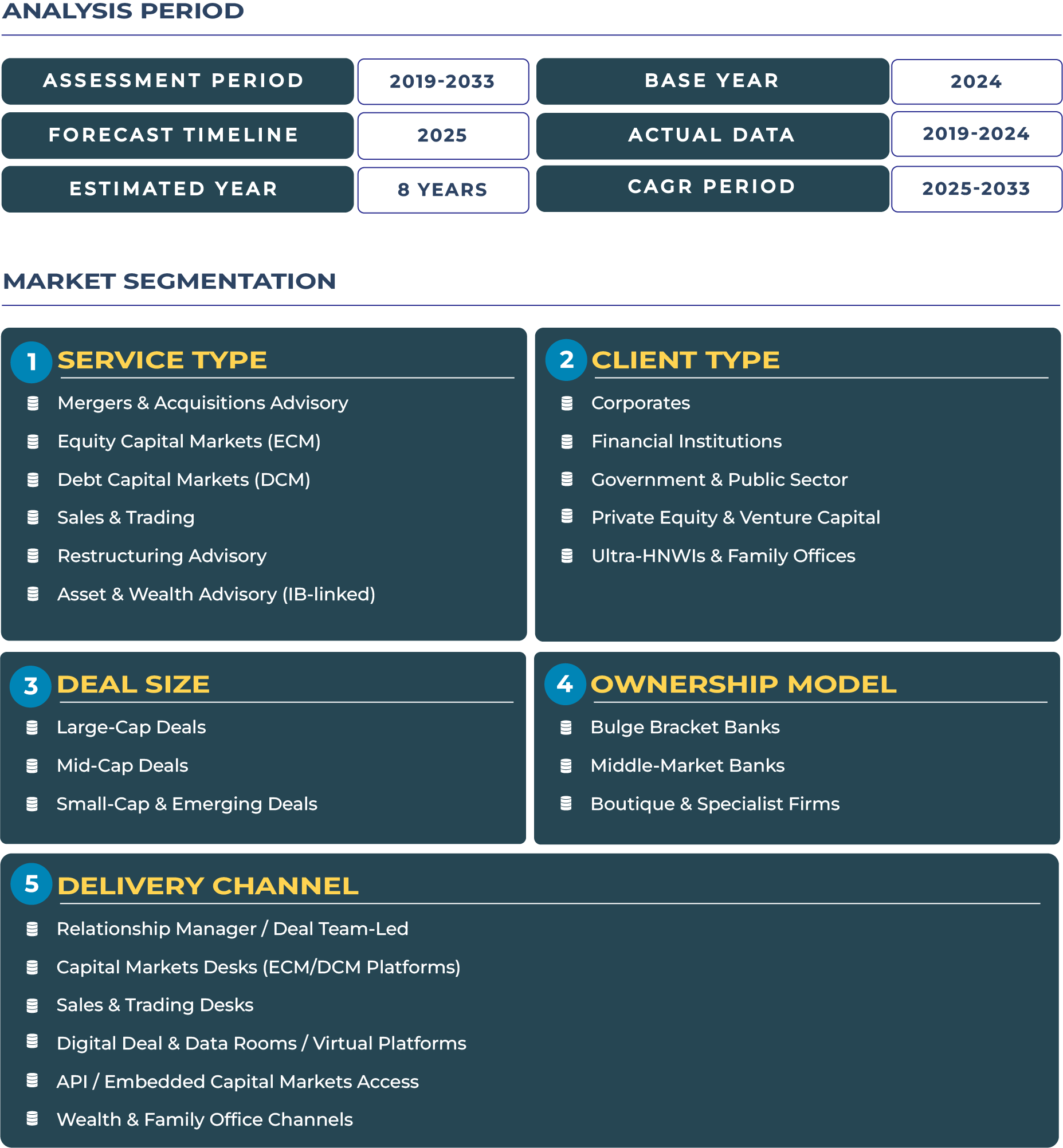South Korea Investment Banking Market Outlook: Navigating the Future of Tech-Driven Advisory and Global Finance Integration
The South Korea Investment Banking Market is emerging as a critical hub for technology-driven cross-border advisory services, redefining the dynamics of corporate finance in Asia. As South Korea strengthens its global presence in technology, electronics, and digital finance, its investment banking sector is rapidly aligning with these transformations. With a market value estimated at USD 8.0 billion in 2025 and expected to reach USD 10.3 billion by 2033, the sector is forecasted to grow at a CAGR of 3.2%. This steady growth reflects the increasing demand for Mergers & Acquisitions advisory, IPO facilitation, and fintech-linked capital market services in a technology-first economy.
Note:* The market size refers to the total revenue generated by banks through various services.
South Korea Investment Banking Sector Embraces the Era of Digital and Cross-Border Expansion
South Korea investment banking industry is witnessing an era of transformation driven by digital innovation, corporate globalization, and resilient capital market reforms. The country's status as a global leader in semiconductors, consumer electronics, and automotive technology has attracted both domestic and foreign investors. This dynamic, in turn, fuels a strong pipeline for equity capital markets and debt capital markets transactions. South Korea’s strategic geographical proximity to major Asian markets, coupled with its robust financial infrastructure regulated by the Financial Services Commission (FSC), strengthens its position as a regional financial hub. Additionally, the focus on sustainable and ESG-linked financing reflects the evolving investor sentiment and aligns with the country’s long-term economic diversification goals.
Drivers: Tech-Driven Corporate Expansion and Digital Capital Integration Fuel Market Growth
The primary driver for the growth of the South Korea investment banking market lies in the nation’s accelerating technology-driven corporate expansions. Major conglomerates like Samsung Group and Hyundai Motor Company continue to lead in cross-border acquisitions and strategic investments. This surge in high-value deals, especially in the semiconductor, electric vehicle, and green energy sectors, has created strong demand for specialized advisory services. Furthermore, the integration of digital banking platforms and AI-based analytics tools enhances deal structuring efficiency, providing banks with competitive differentiation. The growing participation of private equity and venture capital firms in tech startups is also reinforcing the domestic merger and acquisition landscape, expanding opportunities for investment banks across Seoul and Busan.
Restraints: Market Concentration and Regulatory Constraints Create Structural Challenges
Despite the favorable environment, the South Korean investment banking industry faces notable challenges. High market concentration among a few dominant players such as KB Financial Group, Shinhan Financial Group, and Mirae Asset Securities limits market fluidity and innovation. Regulatory constraints imposed by the Bank of Korea and the Financial Supervisory Service (FSS) emphasize strict compliance and capital adequacy requirements, occasionally slowing deal approvals and foreign investor entry. Additionally, geopolitical tensions with neighboring countries and global economic volatility, including the slowdown in China and interest rate uncertainties in the U.S., have moderated cross-border fundraising activities. The resulting cautious investor sentiment has reduced large-scale IPO activities in certain sectors, creating short-term bottlenecks for market expansion.
Trends: Fintech-Based Advisory and Sustainable Financing Reshape Market Dynamics
The transformation of investment banking in South Korea is being significantly shaped by the rapid integration of fintech solutions. The rise of algorithmic trading, decentralized financing platforms, and digital underwriting tools has streamlined operations across sales and trading segments. Financial institutions are increasingly partnering with fintech firms to digitize client engagement, risk assessment, and transaction execution. Another notable trend is the growing emphasis on sustainability-linked investments and green bond issuances. South Korean investment banks are aligning with global ESG frameworks, promoting sustainable capital allocation, and encouraging corporates to adopt cleaner business models. This synergy between technology and sustainability has become a defining hallmark of the country’s modern investment banking ecosystem.
Opportunities: Cross-Border Tech merger and acquisition and IPO Advisory Lead the Growth Front
Opportunities in the South Korea investment banking sector are being propelled by cross-border merger and acquisition activities and tech IPOs. South Korean technology and entertainment companies are pursuing overseas listings, particularly in the U.S. and Southeast Asia, to access deeper liquidity and global visibility. Investment banks specializing in cross-border advisory are capitalizing on this momentum by offering tailored valuation and regulatory compliance services. Furthermore, the continued growth of domestic startups in artificial intelligence, renewable energy, and biopharmaceuticals presents new IPO opportunities. As foreign investors increasingly seek exposure to Korea’s innovation-driven economy, banks offering data-centric advisory and ESG-oriented investment products are expected to dominate the competitive landscape through 2033.
Competitive Landscape: Local Champions and Global Entrants Redefining Advisory Excellence
The competitive landscape of the South Korean investment banking industry is characterized by strong local institutions and strategic collaborations with global banks. Major players such as Mirae Asset Securities, NH Investment & Securities, and KB Securities have been expanding their advisory portfolios to include digital financing and green bond issuances. International banks like Morgan Stanley and Citigroup are deepening their partnerships with domestic firms to facilitate foreign listings and regional fundraising initiatives. A notable recent development includes KB Financial Group’s expansion of its investment banking division in early 2025 to strengthen global advisory capabilities, reflecting growing demand for technology-sector expertise. The competitive emphasis now lies in innovation-led advisory services, fintech integration, and sustainable finance solutions.







